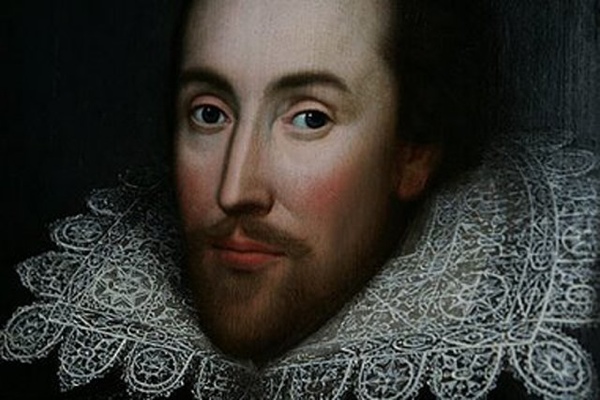Biography Margaret Thatcher
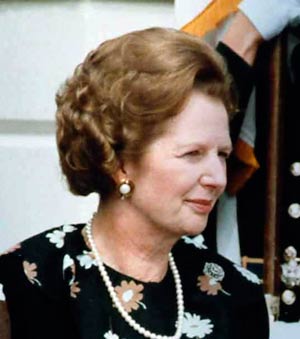 Margaret
Thatcher (1925-2013) was Britain’s first female prime minister, who
became a pivotal figure in British and world politics. After studying at
Somerville College, Oxford university, Mrs Thatcher progressed through
the ranks of the Conservative party to become education minister in Ed
Heath’s government of the early 1970s. It was as education minister that
Mrs Thatcher developed a rather crude nickname of “Maggie Thatcher –
the milk snatcher” It was as education secretary that Mrs Thatcher ended
free school milk. Even as a minister, Mrs Thatcher proclaimed that
Britain would never have a female prime minister.
Margaret
Thatcher (1925-2013) was Britain’s first female prime minister, who
became a pivotal figure in British and world politics. After studying at
Somerville College, Oxford university, Mrs Thatcher progressed through
the ranks of the Conservative party to become education minister in Ed
Heath’s government of the early 1970s. It was as education minister that
Mrs Thatcher developed a rather crude nickname of “Maggie Thatcher –
the milk snatcher” It was as education secretary that Mrs Thatcher ended
free school milk. Even as a minister, Mrs Thatcher proclaimed that
Britain would never have a female prime minister.I don’t think there will be a woman Prime Minister in my lifetime. (BBC Television (5 March, 1973)However, contrary to tradition and expectation, Mrs Thatcher was elected Prime Minister in the Conservative landslide of 1979.
Mrs Thatcher wasted no time in introducing controversial economic policies. She believed that a harsh implementation of Monetarism was necessary to overcome the economic ills of inflation and low growth, which she blamed on the previous Labour government. However, although she was successful in reducing inflation, deflationary monetary policies caused a serious economic recession, in which unemployment rose to 3 million. Opinion was strongly against many of her policies. In a famous letter to the Times newspaper, 360 economist wrote a letter arguing the government should change its policies immediately. However, in true Thatcher style, she refused. Instead she stood up at the Conservative party conference and stated: “You turn if you want to, but this lady is not for turning.” It was characteristic of her whole premiership – fierce in her beliefs and unwavering in her commitment.
“To me, consensus seems to be: the process of abandoning all beliefs, principles, values, and policies in search of something in which no one believes, but to which no one objects; the process of avoiding the very issues that need to be solved, merely because you cannot get agreement on the way ahead. What great cause would have been fought and won under the banner ‘I stand for consensus’?”- Mrs Thatcher, The Downing Street Years (1993)
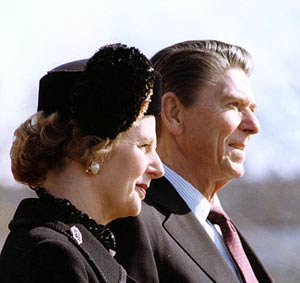 In
the midst of the recession, the Falklands islands were invaded by the
Argentinean army. Mrs Thatcher sent a British expeditionary force to
reclaim the islands. With relatively light casualties (although many
hundreds died in the conflict) the islands were retaken. This military
victory brought a fillip in support for Thatcher. However, it is worth
noting she was criticised for both her decision to sink the Belgrano
(which was sailing away from the conflict zone) Others also criticised
her triumphalist spirit. On reclaiming the islands, Mrs Thatcher
proclaimed:
In
the midst of the recession, the Falklands islands were invaded by the
Argentinean army. Mrs Thatcher sent a British expeditionary force to
reclaim the islands. With relatively light casualties (although many
hundreds died in the conflict) the islands were retaken. This military
victory brought a fillip in support for Thatcher. However, it is worth
noting she was criticised for both her decision to sink the Belgrano
(which was sailing away from the conflict zone) Others also criticised
her triumphalist spirit. On reclaiming the islands, Mrs Thatcher
proclaimed:Just rejoice at that news and congratulate our forces and the marines. .. Rejoice.Many felt this was inappropriate given the recent casualties on both the British and Argentinian sides.
Another defining feature of the early Thatcher administration was her battle with trades unions. Thatcher wanted to reduce the power of trades unions, in particular, she wished to reduce the influence of the militant mine workers union, the NUM led by Arthur Scargill. Mrs Thatcher prepared the country for a long strike; when the miners went all out on strike in 1984, they were eventually forced back into work after a year long bitter struggle.
In foreign policy, she got on well with American President Ronald Reagan. But, she also expressed respect for Russian President Mikhail Gorbachev. She famously said of Gorbachev, that ‘he was a man who we could do business with’
Mrs Thatcher visited the Soviet Union in 1987, and was well received with thousands turning up to see the Iron Lady. The term ‘Iron Lady’ was initially designed as a critical label by a Russian newspaper, but Thatcher seemed to revel in the label, and it stuck.
On a domestic front, the remaining years of her premiership were overshadowed by her controversial and dogmatic decision to stick with the poll tax. This was widely regarded as an unfair tax because everybody paid the same amount regardless of income. Opposition to the poll tax spilled over into violent protest and her popularity plummeted. She also became associated with policies to promote individualism. In one quote (often taken out of context) she said:
Charles de Gaulle Biography
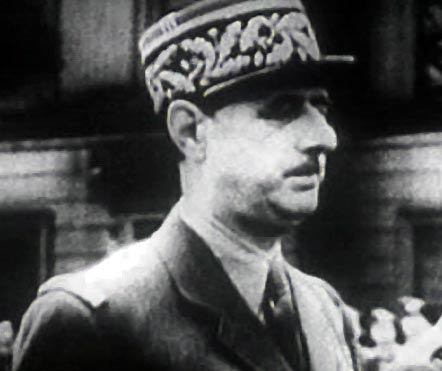 Charles
de Gaulle (22 November 1890 – 9 November 1970) was a French general and
statesman who acted as leader of the Free French during the Second
World War. One of the most influential French politicians he helped
found the Fifth Republic in 1958 and served as its first President from
1959 to 1969. He was a right wing conservative and was a keen French
Nationalist. His brand of right wing conservatism is branded Gaullism.
Charles
de Gaulle (22 November 1890 – 9 November 1970) was a French general and
statesman who acted as leader of the Free French during the Second
World War. One of the most influential French politicians he helped
found the Fifth Republic in 1958 and served as its first President from
1959 to 1969. He was a right wing conservative and was a keen French
Nationalist. His brand of right wing conservatism is branded Gaullism.Short Biography of Charles de Gaulle
“Whatever happens, the flame of the French resistance must not be extinguished and will not be extinguished. “- Address June 18, 1940
Charles de Gaulle was born in Lille (Flanders) in 1890. His family was devout Roman Catholic and conservative. This brand of nationalism and conservative Catholicism influenced De Gaulle’s politics throughout his life.
De Gaulle, studied in Paris and joined the military academy of St. Cyr. In 1913, he joined an infantry regiment commanded by Petain. During the First World War, De Gaulle was wounded on two occasions and was involved in the heavy fighting around Verdun. It was at Verdun, in 1916, that de Gaulle was captured by the Germans and spent the remainder of the war as a Prisoner of war – despite his repeated attempts to escape.
After the war, De Gaulle remained in the military and became interested in the new developments of military strategy. He came to believe the future of war would rest on highly mobile mechanized units – principally tank units backed up with air support. In 1934, he published a book ‘The Army of the Future’ which talked about the importance of this new form of fast moving militarised warfare. However, De Gaulle’s views were not popular with either the military or politicians. The French remained committed to the more static view of warfare characterized by the Maginot line and the trenches of the First World War. Combined with De Gaulle’s capacity to irritate senior officers, he was marginalised from the military and refused promotion. He also fell out with Petain over a 1938 book on ‘France and Her Army’
However, during the German invasion of France in 1940, De Gaulle was given command of a tank unit. At Caumont on the 28th May, 1940, his unit provided one of the few occasions where the German advance was stalled and briefly pushed back. However, lacking air support and overwhelmed by the superior German armed divisions, French fell into a humiliating retreat. During the crisis, De Gaulle was briefly made Minister of War by French Prime Minister Paul Reynaud, But, after just six weeks of fighting, many French politicians, led by Petain, wanted to seek an armistice with the Germans. This led to the creation of Vichy France.
General Charles de Gaulle was the most senior army officer to reject the armistice – seeing it as a betrayal of France. He said in a proclamation, June 18 1940.
“France has lost a battle, but France has not lost the war. ”Under threat of arrest he escaped to Britain where he became the leader and symbol of the Free French who opposed the German occupation.
“Whatever happens, the flame of the French resistance must not be extinguished and will not be extinguished. Tomorrow, as today, I will speak on Radio London.”

Let us be firm, pure and faithful; at the end of our sorrow, there is the greatest glory of the world, that of the men who did not give in.(Charles de Gaulle, July 14 1943)
Despite divisions within the French resistance (especially with the Communist party) De Gaulle was able to unify the resistance movement in 1943, which maintained an uneasy truce until liberation in 1944.
In 1943, De Gaulle moved to Algeria where he formed the provisional government of France. This presumption of forming a government, annoyed the allies and the French were excluded from the D-Day operations. However, during the liberation of Paris, a small French unit was allowed to lead the drive onto the capital, helping to restore French pride in being part of France’s liberation.
After much persuasion, at the last minute, France was allowed to be one of the four major powers in the post war reconstruction of Europe. In November 1945, De Gaulle was unanimously elected the first leader of the new French government. He held this post until his resignation in 1946. After his resignation, formed his own political party the Rally of the French People (RFP) but it never attained electoral success and De Gaulle retired from politics.
However, during the Algerian crisis of 1958, De Gaulle was recalled to power. He was elected President and helped found the new constitution of the Fifth French republic. Despite being a strong nationalist, he agreed to give Algeria independence. This was seen as a betrayal by many in the military who had supported De Gaulle and were committed to defending Algeria. This led to numerous attempts on his life, though non were successful.
Back in power, De Gaulle wished to pursue an independent foreign policy, not aligned to either the US or UK. He took France out of NATO, created their own atom bomb and twice vetoed British entry into the European Economic Community.
The last years of his presidency were ones of great turmoil. Massive student protests and riots left the country de stabilised and in April 1969, he left office. He died shortly after on the 9th November.
Christopher Columbus Biography
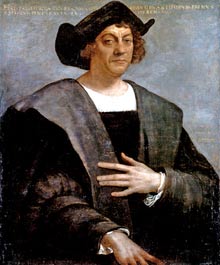 (1451 – 1506) was an Italian explorer, colonizer, and navigator. He is
remembered as the principle discoverer of the Americas and helped bring
the Americas to the forefront of the western consciousness. His
discoveries and travels laid the framework for the later European
colonisation of Latin and North America.
(1451 – 1506) was an Italian explorer, colonizer, and navigator. He is
remembered as the principle discoverer of the Americas and helped bring
the Americas to the forefront of the western consciousness. His
discoveries and travels laid the framework for the later European
colonisation of Latin and North America.“You can never cross the ocean unless you have the courage to lose sight of the shore.”— Christopher Columbus
Short bio Christopher Columbus (1451 – 1506)
 Christopher
Columbus was born in the Republic of Genoa, in what is today north
Western Italy. His father was a middle class wool merchant. Columbus
learnt to sail from and early age, and later worked as a business agent,
travelling around Europe to England, Ireland and later along the West
coast of Africa. He was not a scholar, but was an enthusiastic
self-educated man, who read extensively on astronomy, science and
navigation. He also became fluent in Latin, Portuguese and Spanish.
Christopher
Columbus was born in the Republic of Genoa, in what is today north
Western Italy. His father was a middle class wool merchant. Columbus
learnt to sail from and early age, and later worked as a business agent,
travelling around Europe to England, Ireland and later along the West
coast of Africa. He was not a scholar, but was an enthusiastic
self-educated man, who read extensively on astronomy, science and
navigation. He also became fluent in Latin, Portuguese and Spanish.Christopher Columbus was a believer in the spherical nature of the world (some Christians still held the view that the world was flat). Though his views on the global nature of the world were not unique. An ambitious man, Christopher Columbus hoped to find a Western approach to the lucrative Spice markets in Asia. Rather than sailing East, he hoped that sailing west would lead to countries like Japan and China.
To gain the necessary funding and support for his journeys, he approached the Catholic Monarchs of Spain. As part of his offer, he said that he hoped to be able to spread Christianity to ‘heathen lands’ in the east. The Spanish monarchs agreed to fund Columbus, partly on the missionary efforts, but also hoping to gain an upper hand in the lucrative trade markets.
Voyages to the Americas
Columbus’ first voyage was completed in 1492, he had intended to sail to Japan, but ended up in the Bahamas, which he named San Salvador.Columbus made a total four journeys, where he sailed extensively around the Caribbean islands of Cuba, Jamaica, the Bahamas and also to the mainland, to places such as Panama.
Columbus was not the first person to reach America. Previous successful voyages included a Norse expedition led by Leif Ericson. However, Columbus was the first to travel to America and establish permanent settlements. Columbus’s voyages and reports, over the next 400 years, encouraged all the major European powers to seek to colonise parts of America.
As part of the deal, the Spanish monarchy Columbus was appointed Viceroy and Governor of the Indies in the island of Hispaniola. He also delegated the governorship to his brothers. However, in 1500, on the orders of the Spanish monarchy, Columbus was arrested and placed in chains. There were allegations of incompetence, misrule and barbaric practises in the governorship of the new colonies. After several weeks in jail, Columbus and his brothers were released, but Columbus was not allowed to be governor of Hispaniola any more.
Towards the end of his life, Columbus became increasingly religious. In particular, he became fascinated with Biblical prophecies and wrote ‘Book of Prophecies’ (1505)
Columbus died in 1506, aged 54 from a heart attack related to reactive arthritis. Undoubtedly, the rigours of travelling across the seas weighed upon Columbus’ health. Towards the end of his life, he was frequently in pain from his journeys.
Columbus is venerated in America as the man who helped but America on the map. Columbus Day is observed on 12 October in Spain and across the Americas. Others take a more critical view of Columbus pointing to evidence of mistreatment of native Indians, which set the tone for the next several centuries of mistreatment.
Biography George Orwell
Early Life of George Orwell
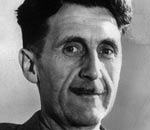 George
Orwell, (25 June 1903 – 21 January 1950) has proved to be one of the
twentieth century’s most influential and thought provoking writers. His
relatively small numbers of books have created intense literary and
political criticism. Orwell was a socialist, but at the same time he did not fit into any neat ideology. At times, he exasperated the more doctrinaire left wingers
with his enthusiasm for taking opposing views. He was foremost a
political writer, but for Orwell his object was not to promote a certain
point of view, but to arrive at the truth; exposing the hypocrisy and
injustice prevalent in society.
George
Orwell, (25 June 1903 – 21 January 1950) has proved to be one of the
twentieth century’s most influential and thought provoking writers. His
relatively small numbers of books have created intense literary and
political criticism. Orwell was a socialist, but at the same time he did not fit into any neat ideology. At times, he exasperated the more doctrinaire left wingers
with his enthusiasm for taking opposing views. He was foremost a
political writer, but for Orwell his object was not to promote a certain
point of view, but to arrive at the truth; exposing the hypocrisy and
injustice prevalent in society.Orwell in Burma
Orwell had a fascinating life story. Brought up by in a poor, aspiring middle class family, Orwell was educated at Eton and left with firmly held “middle class” values, but at the same time a sense of unease with his social position. For want of a better job, Orwell took a job with the Burmese civil service. It was here in Burma, that Orwell would begin to assert his independence from his privileged upbringing. Revealingly, Orwell later told how he found himself rooting for the local population, and despising the Imperial ideology which he represented. He resigned from his position in 1927. In an essay Shooting the Elephant he describes he feelings on Burma:“Theoretically and secretly of course, I was always for the Burmese and all against the oppressors, the British. As for the job I was doing I hated it more bitterly than I can perhaps make clear” (1)It was in the nature of George Orwell to try and see a situation from other people’s point of view. He was unhappy at accepting the conventional social wisdom. In fact, he grew to despise his middle class upbringing so much he decided to spend time as a tramp. He wanted to experience life from the view of the gutter. His vivid experiences are recorded in his book “Down and out in Paris and London”. No longer could Orwell be described as a “Champagne Socialist”; by living with the poorest and underprivileged, he gained a unique insight into the practical workings of working class ideas and working class politics.
The Road to Wigan Pier
In the middle of the great depression, Orwell undertook another experience travelling to Wigan; an industrial town in Lancashire experiencing the full effects of mass unemployment and poverty. Orwell freely admitted how, as a young child, he was brought up to despise the working class. He vividly tells how he was obsessed with the idea that the working classes smelt:“At a distance.. I could agonise over their sufferings, but I still hated them and despised them when I came anywhere near them.” (2)The Road to Wigan Pier offered a penetrating insight into the condition of the working classes. It was also a right of passage for Orwell to live amongst the people he had once, from a distance, despised. The Road to Wigan Pier inevitably had a political message; but characteristically of Orwell it was not all pleasing to the left. For example, it was less than flattering towards the Communist party. This was despite the book being promoted by a mostly Communist organisation – The Left Book club.
Orwell and the Spanish Civil War
It was fighting in the Spanish Civil war that Orwell came to really despise Communist influences. In 1936, Orwell volunteered to fight for the fledgling Spanish Republic, who at the time were fighting the Fascist forces of Gen Franco. It was a conflict that polarised nations. To the left, the war was a symbol of a real socialist revolution, based on the principles of equality and freedom. It was for these ideals that many international volunteers, from around the world, went to Spain to fight on behalf of the Republic. Orwell found himself in the heart of the Socialist revolution in Barcelona. He was assigned to an Anarchist – Trotskyist party – P.O.U.M. More than most other left wing parties, they believed in the ideal of a real Marxist revolution. To members of the P.O.U.M, the war was not just about fighting the Fascist menace but also delivering a Socialist revolution for the working classes. In his book, “Homage to Catalonia” Orwell writes of his experiences; he notes the inefficiency with which the Spanish fought even wars. He was enthused by the revolutionary fervour of some of his party members; however, one of the overriding impressions was his perceived betrayal of the Republic, by the Stalinist backed Communist party.“the Communists stood not upon the extreme Left, but upon the extreme right. In reality this should come as no surprise, because the tactics of the Communist parties elsewhere” (3)Unwittingly he found himself engaged in a civil war amongst the left, as the Soviet Union backed Communist party turned on the Trotskyite factions like P.O.U.M. In the end, Orwell narrowly escaped with his life, after being shot in the throat. He was able to return to England, but he had learnt at first hand how revolutions could easily be betrayed; ideas that would later shape his seminal work “Animal Farm”
During the war Orwell was declared unfit for active duty. He actively supported the war effort (He didn’t wait for the Soviet Union to enter like some communists.)
The two great novels of Orwell were “Animal Farm” and “1984”. Animal Farm is a simple allegory for revolutions which go wrong, based primarily on the Russian revolution.
Articles
References
- George Orwell, “Shooting an elephant”, George Orwell selected writings (1958) p.25
- George Orwell, “Road to Wigan Pier” (Harmondswith) 1980 p.130
- George Orwell, Homage to Catalonia 1959 p.58
Charles Darwin Biography
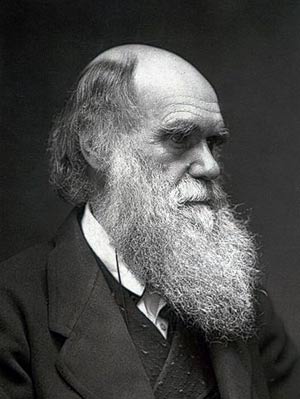 Charles Darwin
was an English Natural scientist who laid down a framework for the
theory of evolution – showing how Man evolved from lower life forms. At
the time, his research and publication led to bitter controversy, but his theory of evolution and natural selection became accepted within the scientific community.
Charles Darwin
was an English Natural scientist who laid down a framework for the
theory of evolution – showing how Man evolved from lower life forms. At
the time, his research and publication led to bitter controversy, but his theory of evolution and natural selection became accepted within the scientific community.Charles Darwin was born on 12 February 1809 in Shrewsbury, Shropshire. He was born in to a wealthy and influential family. His grandfathers included – china manufacturer Josiah Wedgwood, and Erasmus Darwin, one of the leading intellectuals of 18th century England.
Darwin planned to study medicine at Edinburgh university, but later, at the instigation of his father, changed to studying Divinity at Christ’s College, Cambridge University. Darwin was not a great student, preferring to spend time in outdoor pursuits, he spent a lot of time examining natural science and beetle collecting. After gaining a passionate interest in natural science, Darwin was offered a place on the HMS Beagle to act as natural scientist on a voyage to the coast of South America.
At the time, religion was a powerful force in society, and most people took the Bible as the infallible, literal word of God. This included the belief that God created the world in seven days, and the world was only a few thousand years old. However, on the voyage, Darwin increasingly began to see evidence of life being much older. In particular Lyell’s ‘Principles of Geology’ suggested that fossils were evidence of animals living hundreds of thousands of years ago.
On the voyage, Darwin made copious notes about specimens he found on his voyages. In particular, at the Galapagos Islands 500 miles west of South American, Darwin was struck by how the Finch was different on each individual island. He noticed that the Finch had somehow adapted to the different aspects of the particular island.
Over the next 20 years, Darwin worked on the dilemma of how species evolve and can end up being quite different on different islands. Influenced by the work of Malthus, Darwin came up with a theory of natural selection and gradual evolution over time.
In the struggle for survival, the fittest win out at the expense of their rivals because they succeed in adapting themselves best to their environment.- Charles Darwin
Darwin continued to refine his theory, and would intensively breed plants to work on his theories. However, realising how controversial his ideas were, Darwin delayed publishing them. It was not until learning that another naturalist, Alfred Russel Wallace, had developed similar ideas, that Darwin was galvanised into publishing his own book.
In 1859, the ground-breaking ‘On the Origin of Species by Means of Natural Selection’ was published. It immediately gained widespread interest and attention, leading to intense debate about the contention that man – by implication was descended from animals like the Ape.
Owing to this struggle for life, any variation, however slight and from whatever cause proceeding, if it be in any degree profitable to an individual of any species, in its infinitely complex relationship to other organic beings and to external nature, will tend to the preservation of that individual, and will generally be inherited by its offspring.- Charles Darwin , Origin of Species (1859)
However, by the time he died on 19 April 1882, his ideas had increasingly become accepted – at least by the scientific and non-religious society. He was given a state burial at Westminster Abbey.
Darwin’s Religious Beliefs
Darwin was brought up in the Church of England, and at one point was being trained to be an Anglican priest. Like many of his generation, he took the Bible as the literal word of God, and often quoted it as a source of moral authority. However, after his epic voyage to South America, he become doubtful of the Bible as a source of history; he also felt no reason why all religions couldn’t be true.From 1849, he stopped going to church, though he never considered himself to be an atheist. He felt that ‘agnostic’ suited his beliefs more closely. He wrote in his autobiography that he eventually gave up Christianity as he disagreed with the conclusion that all non-believers spend eternity in hell.
I can indeed hardly see how anyone ought to wish Christianity to be true; for if so the plain language of the text seems to show that the men who do not believe, and this would include my Father, Brother and almost all my best friends, will be everlastingly punished.He was politically liberal, being an opponent of slavery. He experienced the brutality of how people treated their slaves in a Spanish colony.
I have watched how steadily the general feeling, as shown at elections, has been rising against Slavery. What a proud thing for England if she is the first European nation which utterly abolishes it!Letter to J. S. Henslow (March 1834)
Citation : Pettinger, Tejvan. “Biography of Charles Darwin“, Oxford, www.biographyonline.net – 4th Sept. 2012.
Facts about Charles Darwin
- He was the grandson of Josiah Wedgwood the famous furniture manufacturer.
- He studied medicine at the University of Edinburgh but found lectures dull.
- He learned taxidermy from John Edmonstone, a freed black slave.
- Darwin became an enthusiastic Beetle collector – which was a craze at the time.
- His father sent him to Christ’s College, Cambridge with the intention of training him as an Anglican parson. He later gave up Christianity.
- His five-year voyage on HMS Beagle established him as an eminent geologist and popular writer. His observations would be used to develop his theory of evolution.
- He sometimes questioned his own scientific discoveries. ‘I feel most deeply that this whole question of creation is too profound for human intellect.’
- In modified form, Darwin’s theory of evolution is now seen as the unifying theory of the life sciences.
- On the new Galápagos Islands Darwin saw many samples of animals which showed relations to animals in other parts of the world, e.g. Mockingbirds in Chile.
- During the Beagle expedition Darwin shipped home a total of 1,529 species preserved in spirit and 3,907 labelled dried specimens.
- Darwin and Wallace’s theories on evolution were both presented on the same day in 1858 to the Linnean Society of London.
- Drawin took 22 years from the end of the voyage to publish his findings – he was worried about the reaction of people. It is said the thought of Wallace publishing first, galvanised him into action
- The full title of Origin of Species is On the Origin of Species by means of Natural Selection, or the Preservation of Favoured Races in the Struggle for Life.
- Darwin did not coin the phrase ‘survival of the fittest’. It was added to the fifth edition of Origin of Species. The phrase came from economist Herbert Spencer.
- Darwin has appeared on more UK stamps than anyone outside the Royal Family.
- Seven months after the publication of ‘Origin of Species’ the famous 1860 Oxford evolution debate occurred between Thomas Henry Huxley and Bishop Samuel Wilberforce. The debate is considered to be a great moment in natural history – and a key moment in the acceptance of evolution.
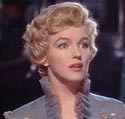 Monroe
married Jimmy Dougherty, in 1942. When he left to the South Pacific to
fight in the Second world War, she joined a local munitions factory in
Burbank, California. It was here that Marilyn got her first big break.
Photographer David Conover, was covering the munitions factory to show
women at work. He was struck by the beauty and photogenic nature of
Norma, and he used her in many of her shots. This enabled her to start a
career as a model and she was soon featured on the front of many
magazine covers.
Monroe
married Jimmy Dougherty, in 1942. When he left to the South Pacific to
fight in the Second world War, she joined a local munitions factory in
Burbank, California. It was here that Marilyn got her first big break.
Photographer David Conover, was covering the munitions factory to show
women at work. He was struck by the beauty and photogenic nature of
Norma, and he used her in many of her shots. This enabled her to start a
career as a model and she was soon featured on the front of many
magazine covers.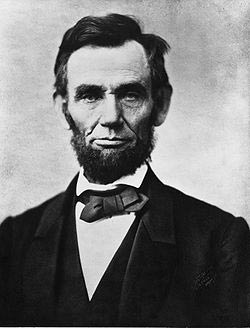 Abraham
lost his mother and his father moved away to Indiana. Abraham had to
work hard splitting logs and other manual labour. But, he also had a
thirst for knowledge and worked very hard to excel in his studies. This
led him to become trained as a lawyer. He spent eight years working on
the Illinois court circuit; his ambition, drive and capacity for hard
work were evident to all around him. He also had a good sense of humour
and was depreciating about his looks.
Abraham
lost his mother and his father moved away to Indiana. Abraham had to
work hard splitting logs and other manual labour. But, he also had a
thirst for knowledge and worked very hard to excel in his studies. This
led him to become trained as a lawyer. He spent eight years working on
the Illinois court circuit; his ambition, drive and capacity for hard
work were evident to all around him. He also had a good sense of humour
and was depreciating about his looks.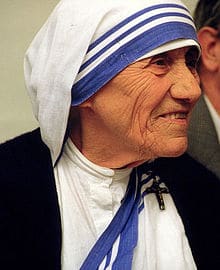 Mother
Teresa was born, 1910, in Skopje, capital of the Republic of Macedonia.
Little is known about her early life, but at a young age she felt a
calling to be a nun and serve through helping the poor. At the age of 18
she was given permission to join a group of nuns in Ireland. After a
few months of training, with the Sisters of Loreto, she was then given
permission to
Mother
Teresa was born, 1910, in Skopje, capital of the Republic of Macedonia.
Little is known about her early life, but at a young age she felt a
calling to be a nun and serve through helping the poor. At the age of 18
she was given permission to join a group of nuns in Ireland. After a
few months of training, with the Sisters of Loreto, she was then given
permission to  She
experienced two particularly traumatic periods in Calcutta. The first
was the Bengal famine of 1943 and the second was the Hindu/Muslim
violence in 1946 – before the partition of India. In 1948, she left the
convent to live full time amongst the poorest of Calcutta. She chose to
wear a white Indian Sari, with blue trimmings – out of respect for the
traditional Indian
She
experienced two particularly traumatic periods in Calcutta. The first
was the Bengal famine of 1943 and the second was the Hindu/Muslim
violence in 1946 – before the partition of India. In 1948, she left the
convent to live full time amongst the poorest of Calcutta. She chose to
wear a white Indian Sari, with blue trimmings – out of respect for the
traditional Indian 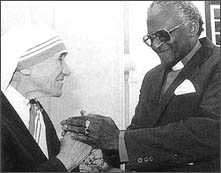 In
1979, she was awarded the Nobel Peace Prize “for work undertaken in the
struggle to overcome poverty and distress, which also constitutes a
threat to peace.” She didn’t attend the ceremonial banquet, but asked
that the $192,000 fund be given to the poor.
In
1979, she was awarded the Nobel Peace Prize “for work undertaken in the
struggle to overcome poverty and distress, which also constitutes a
threat to peace.” She didn’t attend the ceremonial banquet, but asked
that the $192,000 fund be given to the poor.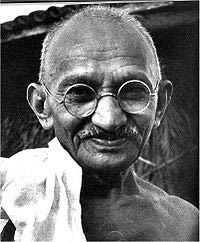 Mohandas
Gandhi was born, 1869, in Porbandar, India. Mohandas was from the
social cast of tradesmen. His mother was illiterate, but her common
sense and religious devotion had a lasting impact on Gandhi’s character.
As a youngster, Mohandas was a good student, but the shy young boy
displayed no signs of leadership. On the death of his father, Mohandas
travelled to England to gain a degree in law. He became involved with
the Vegetarian society and was once asked to translate the Hindu
Bhagavad Gita. This epic of Hindu literature awakened in Gandhi a sense
of pride in the Indian scriptures, of which the Gita was the pearl.
Mohandas
Gandhi was born, 1869, in Porbandar, India. Mohandas was from the
social cast of tradesmen. His mother was illiterate, but her common
sense and religious devotion had a lasting impact on Gandhi’s character.
As a youngster, Mohandas was a good student, but the shy young boy
displayed no signs of leadership. On the death of his father, Mohandas
travelled to England to gain a degree in law. He became involved with
the Vegetarian society and was once asked to translate the Hindu
Bhagavad Gita. This epic of Hindu literature awakened in Gandhi a sense
of pride in the Indian scriptures, of which the Gita was the pearl.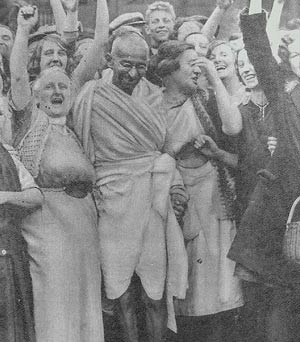 Gandhi
successfully instigated a series of non violent protest. This included
national strikes for one or two days. The British sought to ban
opposition, but the nature of non-violent protest and strikes made it
difficult to counter.
Gandhi
successfully instigated a series of non violent protest. This included
national strikes for one or two days. The British sought to ban
opposition, but the nature of non-violent protest and strikes made it
difficult to counter.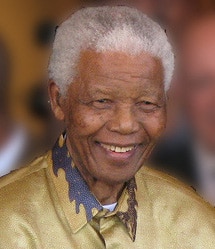 As
one of the few qualified lawyers, Nelson Mandela was in great demand;
also his commitment to the cause saw him promoted through the ranks of
the ANC. In 1956, Nelson Mandela, along with several other members of
the ANC were arrested and charged with treason. After a lengthy and
protracted court case the defendants were finally acquitted in 1961.
However, with the ANC now banned, Nelson Mandela suggested an active
armed resistance to the apartheid regime. This led to the formation of
Umkhonto we Sizwe, which would act as a guerilla resistance movement.
Receiving training in other African countries, the Umkhonto we Sizwe
took part in active sabotage.
As
one of the few qualified lawyers, Nelson Mandela was in great demand;
also his commitment to the cause saw him promoted through the ranks of
the ANC. In 1956, Nelson Mandela, along with several other members of
the ANC were arrested and charged with treason. After a lengthy and
protracted court case the defendants were finally acquitted in 1961.
However, with the ANC now banned, Nelson Mandela suggested an active
armed resistance to the apartheid regime. This led to the formation of
Umkhonto we Sizwe, which would act as a guerilla resistance movement.
Receiving training in other African countries, the Umkhonto we Sizwe
took part in active sabotage.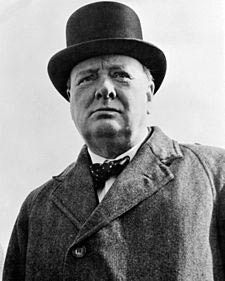 Sir
Winston Leonard Spencer-Churchill, KG, OM, CH, TD, FRS, PC (30 November
1874 – 24 January 1965) was a British politician and author, best known
as Prime Minister of the United Kingdom during the Second World War.
Sir
Winston Leonard Spencer-Churchill, KG, OM, CH, TD, FRS, PC (30 November
1874 – 24 January 1965) was a British politician and author, best known
as Prime Minister of the United Kingdom during the Second World War.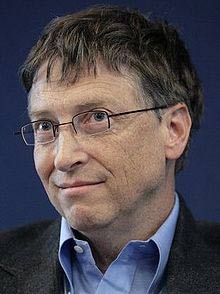 Bill
Gates founded Microsoft in 1976 when he formed a contract with MITTS
(Micro Instrumentation and Telemetry Systems) to develop a basic
Bill
Gates founded Microsoft in 1976 when he formed a contract with MITTS
(Micro Instrumentation and Telemetry Systems) to develop a basic 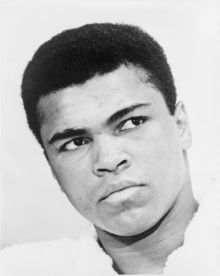 retired
American boxer. In 1999, Ali was crowned “Sportsman of the Century” by
Sports Illustrated. He won the World Heavyweight Boxing championship
three times, and won the North American Boxing Federation championship
as well as an Olympic gold medal.
retired
American boxer. In 1999, Ali was crowned “Sportsman of the Century” by
Sports Illustrated. He won the World Heavyweight Boxing championship
three times, and won the North American Boxing Federation championship
as well as an Olympic gold medal. Clay
won a disputed 10 round decision over Doug Jones, who, despite being
lighter than Clay, staggered Clay as soon as the fight started with a
right hand, and beat Clay to the punch continually during the fight. The
fight was named “Fight of the Year” for 1963. Clay’s next fight was
against Henry Cooper, who knocked Clay down with a left hook near the
end of the fourth round. The fight was stopped in the 5th round due to a
deep cut on Cooper’s face.
Clay
won a disputed 10 round decision over Doug Jones, who, despite being
lighter than Clay, staggered Clay as soon as the fight started with a
right hand, and beat Clay to the punch continually during the fight. The
fight was named “Fight of the Year” for 1963. Clay’s next fight was
against Henry Cooper, who knocked Clay down with a left hook near the
end of the fourth round. The fight was stopped in the 5th round due to a
deep cut on Cooper’s face.
